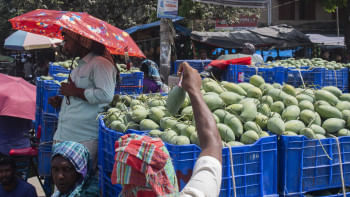'Rampant corruption hobbling global poverty fight'
Corruption is crippling the battle against poverty and robbing oil-rich countries such as Iraq of their development potential, a respected global graft watchdog said yesterday in an annual report on sleaze.
Haiti and Bangladesh were perceived as the world's most corrupt nations in the survey of 146 countries by Transparency International, closely followed by Nigeria, Myanmar and Chad.
"This is an amazing evidence again that corruption is still rampant all over the world," the organisation's chairman Peter Eigen told a press conference in London.
"In most countries economic policy is still perverted by corruption... and therefore poverty cannot be effectively addressed."
The index by the Berlin-based watchdog looks at perceived corruption among public officials and politicians.
Just below the worst five countries were Paraguay and Azerbaijan, all seven of which scored less than two out of a best possible score of 10.
Sixty countries failed to score three out of 10, the mark corresponding to Transparency's benchmark for "rampant corruption," while 106, fully two thirds of those surveyed, scored less than five.
The countries with the cleanest slate were Finland, New Zealand, Denmark, Iceland and Singapore.
Eigen said developing countries in particular must root out sleaze in public works if they hoped to improve the quality of life of their citizens.
"Corruption in large-scale public projects is a daunting obstacle to sustainable development, and results in a major loss of public funds needed for education, health care and poverty alleviation, both in developed and developing countries," he said in a statement.
"If we hope to reach the Millennium Development Goal of halving the number of people living in extreme poverty by 2015, governments need to seriously tackle corruption in public contracting," he said, referring to a United Nations target set in 2000.
He added that nations rich in natural resources too often undermined their own prospects with widespread graft and kickbacks among local leaders and foreign investors.
"Oil-rich Angola, Azerbaijan, Chad, Ecuador, Indonesia, Iran, Iraq, Kazakhstan, Libya, Nigeria, Russia, Sudan, Venezuela and Yemen all have extremely low scores," he said, indicating high corruption.
"In these countries, public contracting in the oil sector is plagued by revenues vanishing into the pockets of Western oil executives, middlemen and local officials."
The anti-corruption official issued a particular warning over Iraq, which he said was at risk because of its combination of oil reserves and post-conflict instability.
"Whenever there is a rush and a push (for reconstruction), particularly when petroleum is involved, the danger of corruption is immense," Eigen said.
He and Jeremy Carver, head of international law at the London firm Clifford Chance, said procurement of large-scale public contracts, such as those being disbursed for Iraq's reconstruction and stabilization, were potential sources of corruption.
Reffering to the US contractor Halliburton, winner of a multi-billion-dollar no-bid contract from the US government for work in Iraq, Carver said: "This is an absolutely clear example of what happens in the post-conflict zone."
"Without strict anti-bribery measures, the reconstruction of Iraq will be wrecked by a wasteful diversion of resources to corrupt elites," Eigen said.
He urged Western countries to require oil companies to open their books to show what they pay in fees, royalties and other payments to host governments and state oil companies.

 For all latest news, follow The Daily Star's Google News channel.
For all latest news, follow The Daily Star's Google News channel. 



Comments